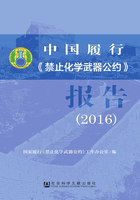
Ⅰ Government's Role in Implementation
The Chinese government has always supported the legal system and multilayer implementation mechanism of the Chemical Weapons Convention(hereinafter shorted as“the Convention”). Leadership of authorities at various levels, including the Central Military Commission, the Ministry of Industry and Information Technology and the Ministry of Foreign Affairs, listened to implementation reports for many times, participated in relevant activities, provided instructions, identified requirements and helped coordinate to solve problems. On May 26, Fan Changlong, Vice Chairman of the Central Military Commission, paid a visit in person to examine safety management in Harbaling, Dunhua, Jilin Province-the site of Japan's ACW excavation, recovery and destruction, where he conveyed greetings to Chinese staff and stressed the urgency for Japan to practically fulfill its obligation by inputting more resources and accelerating destruction progress so as to clear the land as soon as possible for the Chinese people. On April 29, Miao Wei, Minister of Industry and Information Technology made clear requirements on CWC implementation under new circumstances during his visit to the Implementation for Peace-Celebrating the First OPCW Day exhibition held in the Xidan campus of the Ministry of Industry and Information Technology(MIIT). On August 29, Jin Shubo, head of Discipline Inspection and member of CPC Party Group of MIIT attended the OPCW international inspection exercise by the National CWC Implementation Office(NCIO)in CNPC Urumqi Petrochemical. On April 29, an article titled“Stringent CWC Implementation for Achievements in Chemistry to Benefit Human Beings”by Huai Jinpeng, Vice Minister of MIIT was published in China Industry News and China Electronics News and in his interview with the journalist from China Chemical Industry News, Mr. Huai elaborated the importance of implementation, summarized China's progress and proposed future steps in implementing the Convention. In the National Implementation Workshop on December 9, Huai Jinpeng made a speech in which he urged all implementing authorities to study and keep well aware of current situation and tasks, better understand the importance of implementation to world peace and national security, build stronger sense of urgency, responsibility and commitment, adhere to the overall value of national security, take into account both domestic and international situations, balance development and security issues, innovate and work in a pragmatic manner to ensure the fulfillment of all obligations and protect the image of China as a responsible country. On September 18, Liu Lihua, Vice Minister of MIIT went to Nanjing Chemical Industrial Park in Jiangsu for a field study on import/export review of controlled chemicals and relevant legislation efforts. In the research, Liu Lihua pointed out the importance of implementation to world peace and security. And strengthened that the import/export management and prevention of proliferation of controlled chemicals are not only the international obligations for implementing the Convention but also the internal demands of safeguarding national security. On October 20, Guan Youfei, deputy head of the JACW leading group and head of the Office for International Military Cooperation of Central Military Commission attended the Recovered Clean Land-Exhibition on the Disposal of Chemical Weapons Abandoned by Japan in China held in Nanjing and accepted an interview with the press. On September 17, Kong Xuanyou, Assistant Foreign Minister attended and addressed the opening ceremony of Recovered Clean Land; on June 14, Kong Xuanyou met Ambassador Hamid Ali Rao, OPCW Deputy Director-General who went to China for the“Seminar on Trade Policies and Export Control of Chemicals”and the two exchanged ideas on issues such as China's relationship with OPCW and JACW.
As the national authority, the Ministry of Industry and Information Technology(MIIT)has been serious in fulfilling its due responsibilities and organizing and coordinating national implementation efforts, which is incorporated into working plans of the Ministry with sufficient budget funding and listed as one of its priorities and objectives to be evaluated. MFA, MND and other parties to the Inter-Ministry Implementation Meeting, according to their division of duties, carried out a lot work and played important roles in international collaboration, military efforts and assistance to the Japanese government in destructing chemical weapons abandoned in China.
In 2016, NCIO, MFA Department of Arms Control, MNDJACW Office and other agencies made collaborative efforts in studying and analyzing current implementation landscapes and developing corresponding policies to ensure implementation in the spirit of“hard-working for solid results”. In March, NOI circulated the Priorities of working focus 2016 in Implementing the Chemical Weapons Convention, which urged provincial/municipal implementing offices to fulfill their obligations based on local condition. On December 9 and 10, NOI held a national implementation workshop in Wuxi, Jiangsu. MIIT Vice Minister Huai Jinpeng addressed the workshop and Xiao Chunquan, head of Production Safety NCIO gave a report a work. The workshop was also attended by representatives from MFA, the Office for International Military Cooperation of CMC, MOFCOM, State Administration of Work Safety and General Administration of Customs(GAC). Other efforts included the National Workshop on Implementation Education, themed campaigns for“The First OPCW Day”and revision of Rules of Management Regulations for Controlled Chemicals; National declarations to OPCW were well completed with 1,347 declared facilities, or 26% in world's total; all 28 inspections to industrial facilities were passed, adding the total number to 360;1 inspection exercise as held in CNPC Urumqi Petrochemical; Special programs for controlled chemicals supervision were carried out nationwide with reported results;18 facilities were approved to produce controlled chemicals,86 special production licenses granted and 655 import/export contracts approved; the Annual Report on CWC Implementation by China(2015)was compiled and published; a national training program for implementation was organized; the monthly newsletter, Controlled Chemicals Newsletter was published;1 staff was recommended and accepted as member of OPCW Advisory Board on Education and Outreach.